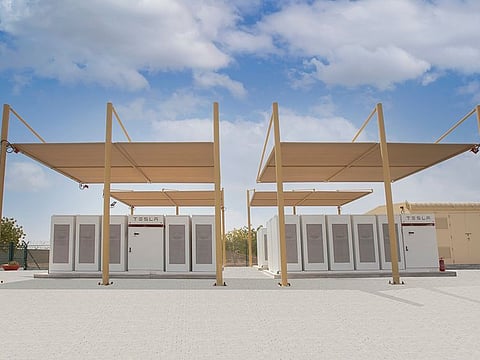Dubai’s Mohammed bin Rashid Al Maktoum solar park gets Tesla’s lithium-ion energy storage solution
This project aims to diversify the energy mix and enhance energy storage technologies

Also In This Package
Dubai: Dubai Electricity and Water Authority (DEWA) has inaugurated a pilot project for energy storage at the Mohammed bin Rashid Al Maktoum Solar Park using Tesla’s lithium-ion battery solution. The project has a power capacity of 1.21 MW and an energy capacity of 8.61 MWh with a life span of up to 10 years.
“The energy storage project using Tesla’s lithium-ion battery solution at the Mohammed bin Rashid Al Maktoum Solar Park, aims to diversify the energy mix and enhance energy storage technologies,” said Saeed Mohammed Al Tayer, MD & CEO of DEWA. “The pilot project will evaluate the technical and economic capabilities of this technology.”
“It also tests the role of this technology in the integration between clean energy and energy storage to achieve maximum efficiency and reliability,” added Al Tayer.
Upcoming projects
DEWA is implementing other energy storage projects that includes, using Concentrated Solar Power (CSP) in the 4th phase of the Mohammed bin Rashid Al Maktoum Solar Park. The project combines CSP and photovoltaic solar panels with a production capacity of 950MW.
The project will have the world’s largest global thermal storage capacity of 15 hours, facilitating energy availability round the clock.
DEWA is also implementing a 250MW pumped-storage hydroelectric power station in Hatta, the first of its kind in the Arabian Gulf region. It will generate electricity using the water stored at Hatta Dam with a storage capacity of 1,500 MWh. In collaboration with Expo 2020 Dubai and Siemens Energy, DEWA has inaugurated the Green Hydrogen project, the first of its kind in the Middle East and North Africa to produce green hydrogen using solar power. The project was implemented at the outdoor testing facilities of DEWA’s R&D Centre at the solar park.









